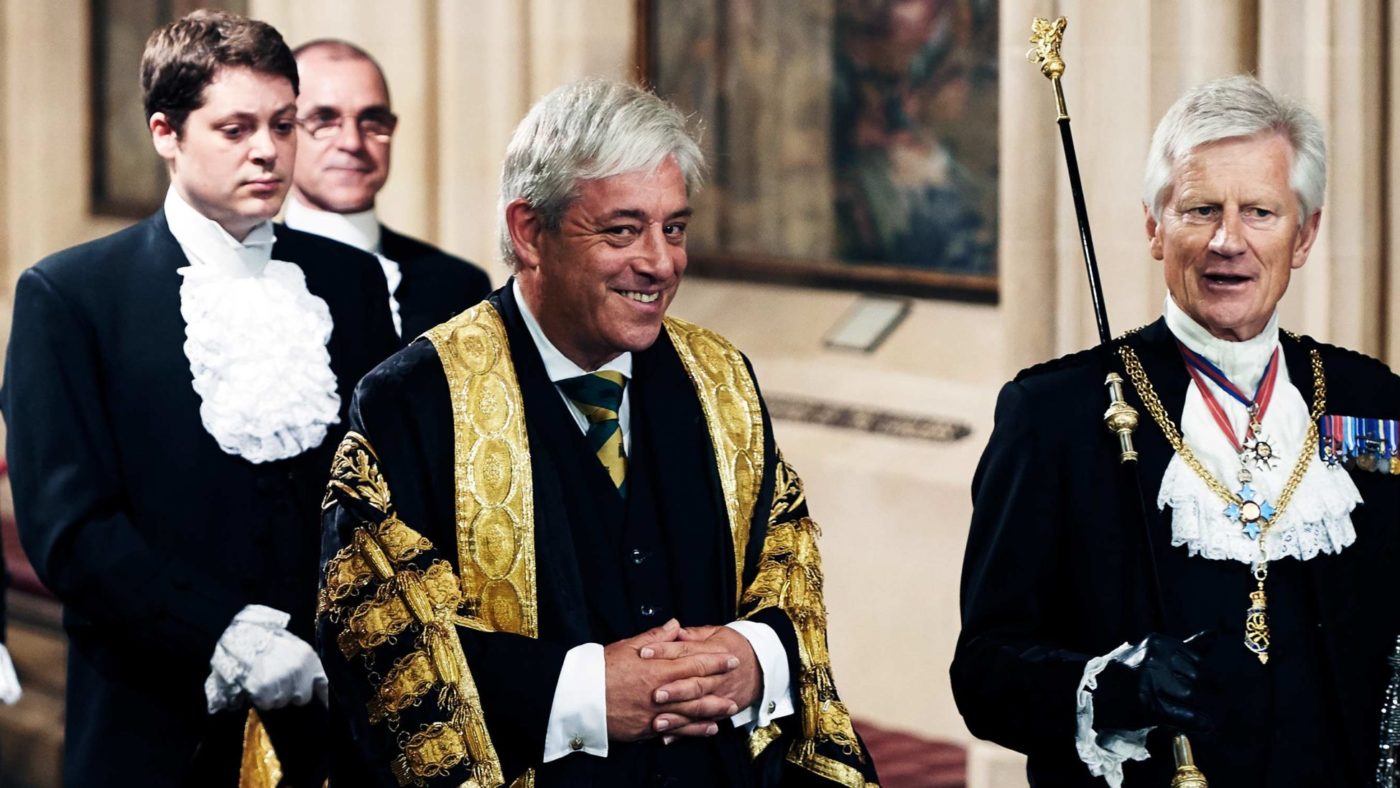John Bercow is about as even-handed and impartial on the matter of Brexit as Jacob Rees-Mogg. But it shows just how degraded the debate in our national parliament has become that that actually doesn’t matter very much any more.
A few weeks ago I made reference in an article to the fact that the Speaker’s car sported a sticker declaring “Bollocks to Brexit”. Within minutes, his defenders had got in touch to inform me that the sticker was affixed to his wife’s car, not his. This seemed to matter. It does not. No one surely now claims that Bercow is anything other than an anti-Brexit partisan cheering his side’s efforts to thwart our departure from the European Union from the safety of the Commons chair.
His bizarre and dangerous ruling in the Commons today, in favour of selecting an amendment by former Attorney General (and arch Remainer) Dominic Grieve, proposing that the Prime Minister be given a maximum of three days (instead of the current 21) to return to the Commons with a plan B if her withdrawal agreement is rejected by MPs next week, is proof positive of his political position. It is now accepted that his own clerk advised against the constitutionality of allowing the amendment to proceed, and that Bercow overruled him and others of the same opinion.
In some senses the fact of selecting the amendment, and the effect it would have if passed, change very little. On the first point, it will come as no surprise that Bercow opposes Britain’s exit from the EU and is comfortable using his authority in order to prevent it happening. This has been an accepted fact of life at Westminster since before the 2016 referendum.
Virtually every Labour MP in the Commons, formerly proud advocates of women’s and workers’ rights to workplaces free from bullying, chose to suspend that particular principle last year when serious accusations against the Speaker, from more than one reliable source, emerged. Normally – and especially if such allegations had involved a Conservative minister – Labour would have demanded immediate action. But in Bercow’s case – as lucidly explained by Dame Margaret Beckett MP – the cause of opposing Brexit trumps any less important issue such as the rights of Commons members of staff.
On the amendment itself, it is unlikely that the Prime Minister, in the wake of the almost certain rejection of her agreement, could realistically avoid making an immediate statement to MPs anyway. Waiting three weeks would have fatally undermined her authority and that of her government, as well as shattered any remaining confidence of the business community as they stare a hard Brexit in the face. And the nature of her statement in those circumstances has not been specified in legislation.
The most important aspect of today’s proceedings, taken in conjunction with last night’s government defeat, is that Labour MPs – with the glaring exception of the front bench – are no longer seeking to pretend that they believe the result of the 2016 referendum should be honoured. There is no change that could be made to Theresa May’s withdrawal agreement – other than a declaration that we will remain full members of the EU in perpetuity – that would attract support from most Labour MPs.
In this they are fully supported by Bercow, who was always a divisive figure but has grown more so, paradoxically, the longer he has remained in the Speaker’s chair. Previous occupants of that position found themselves growing more respected by both sides of the House – even Michael Martin was considered relatively impartial, despite owing his election almost entirely to MPs of his own party.
Not so with Bercow. His pre-Parliamentary career painted him as an extreme right-winger, a member of the infamous and extreme right-wing Monday Club. Once an MP he quickly glided from right to left, resigning from Iain Duncan Smith’s front bench over his leader’s opposition to gay adoption and earning the attention – and admiration – of Labour MPs. Cynics might see a deliberate strategy emerging from that point, one that would take Bercow seamlessly to the chair.
For the first few years in office he conducted himself as a Speaker should, championing the rights of backbenchers and calling ministers to the dispatch box in unprecedented numbers to answer Urgent Questions. The rot set in after Donald Trump won the US presidency. It does not matter whether Bercow’s opinion of Trump was right or wrong (it was right): what mattered was that the Speaker of the House of Commons diminished himself and the House internationally by publicly disparaging the leader of another nation, particularly the leader of our closest ally. Bercow allowed himself the conceit that his personal political opinion mattered. It did not, and does not. He is the Speaker and while entitled to his opinion, it should never have influenced any action or word uttered in public.
Then there was the allegations of bullying and the accounts of his private secretary being forced to take sick leave following a fraught relationship with Bercow. That Labour chose collectively to sideline these allegations and to side with him out of fear that replacing him with a more neutral figure would weaken their fight against Brexit, is a sin that should, in any fair world, come back to bite the party.
Today has shown that the neutrality of the chair is a disposable luxury, at least when the stakes are this high. This is a great shame and there may come a point in the future when those who are happy today to have a politically interested Speaker will find themselves on the wrong end of such an institution in the future.
We can only hope.


